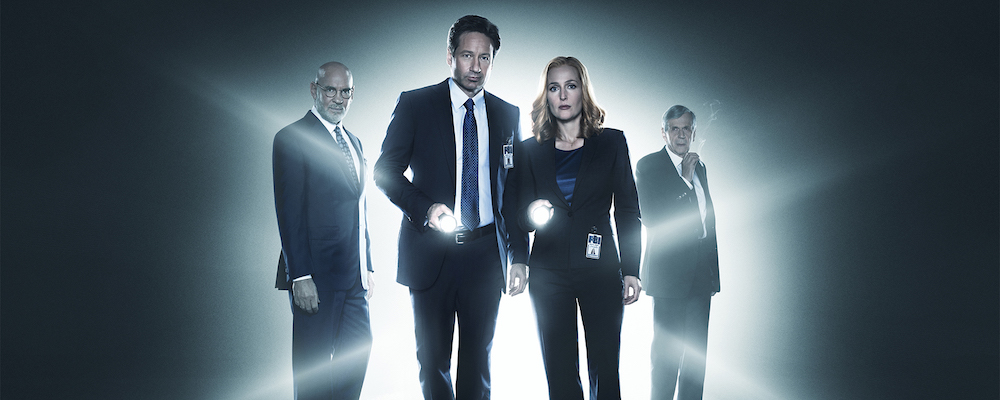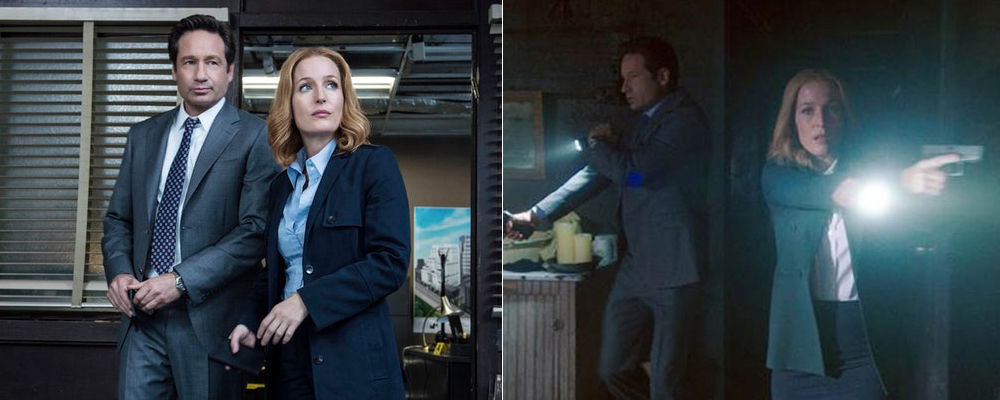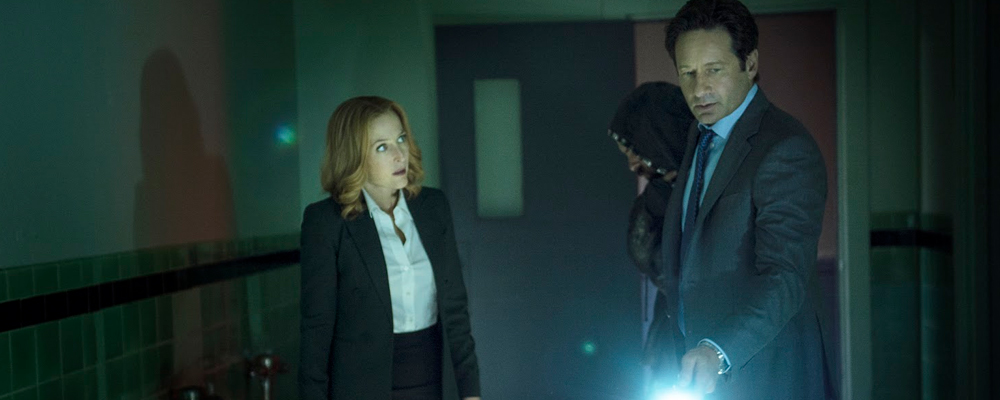‘The X-Files’ Season 11 Exposes Dangers of Administrative Redundancy in Post-Cover-Up Age
Tony Sokol
The world is a different place than it was when “The X-Files” went into the cold case database. Everything Agent Fox “Spooky” Mulder (David Duchovny) warned about, and Special Agent Dana “Skulls” Scully (Gillian Anderson) tested for scientific plausibility, has come true in ways more nightmarish than either had expected. Former real estate mogul Donald J. Trump is in the White House and the entire Federal Bureau of Investigation is on the line at the same time the biggest real estate deal in history is going down. Aliens have been investing in prime locations and are getting ready to evict the former squatters.
In its second year of revival, Season 11 continues to pick up where things left off 14 years after the last season and 7 since the second film. It starts with a cavalcade of conspiracies, from the crash landing of an alien space ship in New Mexico in 1947, through the Kennedy assassination, moon landing and beyond, as remembered by the man who had his tobacco-stained fingers all over them: The Cigarette Smoking Man, aka Cancer Man. We even learn his real name, the last of which he shares with a two-term president who was the son of a one-term president. Cancer Man is a modern day Ben Franklin crossed with Edward G. Robinson. He doesn’t hold a specific government title, and yet he is proud to call children everywhere all his sons. He is even the actual father of his own grandson. In a post-9/11 landscape, he reasons it’s the world that’s gone mad, not him.
The world has gone too crazy for even Mulder’s great conspiratorial powers. Submitted for your approval, while real life seems like “The Twilight Zone,” the world of “The X-Files” has been caught in a dimension altered by the Mandela effect, which used to be known as the Mengele effect. Things we thought we remembered aren’t quite what they seemed at the time. The narratives are longer and more philosophical than those spouted by Mulder when he was looking for the ancient mysteries. CGI and quick paced film edits replace aliens with giant heads and big, black sad eyes. Mulder is a self-referential parody of himself who can’t tell a “Twilight Zone” episode from an “Outer Limits” installment. We thought we knew him, and he would bring us all the answers, but he’s been out squatching, his word for Bigfoot hunting.
Scully, meanwhile, has become completely self-aware, being drawn from one case to another like a psychic gyroscope. The over-riding arc has to do with the end of humanity by some kind of alien disease only she and her son, William, are immune to. But after a few monster-of-the-week episodes, the kid himself is a monster one week. The monstrously talented, Oscar-nominated actress Barbara Hershey, who played Mary Magdalene in Martin Scorsese’s controversial “The Last Temptation of Christ,” joins as guest counter-conspirator for the opposition, because contagion is extinction and even worse than global repossession.
The first monster-of the-week episode has to do with a telepathic set of twins, one of whom, Sweet Judy and Demon Judy, is institutionalized, though not at Spotnitz Sanatorium. She plays telepathic hangman with her twin brother, resulting in people being killed by their own doppelgangers. Demon Judy is prone to violence or acting out, at one point throwing “dookies” at the staff and Agent Scully. Sweet Judy later gives pills to Scully, which she says will protect the agent from the insane rage-filled vengeance. The staff explains that the pills are rolled up pieces of bread, and admit that they take them just in case they have some kind of anti-psychotic properties.
By episode 4, “The X-Files” plays with itself in a comic episode. Apparently Mulder and Scully had a third partner, Reggie Something, who not only started the X-Files, but bought the “I want to believe” poster that adorned the office. Mr. Something even has the official Granada UFO postal stamp to prove it. Mulder and Scully write him off as a bad gag in need of some duct tape, until he is recognized by FBI Assistant Director Walter Sergei Skinner (Mitch Pileggi) while being carted off to the looney bin. The ambulance is even fitted with cartoonish nuthouse nets.
Although we lost the Lone Gunmen in a weird precognitive Twin Tower collapse episode, that’s not enough to keep them down. Virtual “Ringo” Langley (Dean Haglund) returns from beyond the grave as a file begging to be deleted. Some things remain constant. Each episode still features a flashlight scene, even though sometimes it isn’t the main agents wielding it. Variables remain inconsistent. Undercover operatives tailing cars don’t remember the makes of those vehicles when they are being followed by the very cars they are tasked to surveille. As rich as the Cigarette Smoking Man gets, he still can’t afford security cameras on his own private property.
2018 finds the FBI is not in good standing with the current administration. Russian operatives have the authority to override federal cops on their own turf. Apology was policy at the end of the nineties, but no one’s saying sorry now, and we can forget about comprehensible explanations. We were taught to trust no one by “The X-Files,” and it fed the fake news hysteria of self-fulfilling predictions of long-forgotten questions.
In a post-cover-up age where the most heinous of acts are celebrated, it would seem “The X-Files,” both the show and the actual investigative unit, would be redundant. But Chris Carter, the creator and guiding force behind the series, continues to inveigle and obfuscate, keeping the drama light and the frivolous heavy. In its second year of revival, “The X-Files” proves beyond the shadow of objective reality that we are not alone in the universe, but nobody out there likes us.
“The X-Files” season 11 premieres Jan. 3 on Fox.



